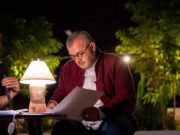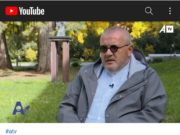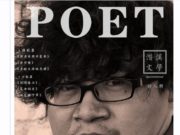Quince poemas/ Fifteen Poems
Translated from Spanish into English by Katherine M. Hedeen
Víctor Rodríguez Núñez (La Habana, Cuba, 1955) es poeta, periodista, crítico, traductor y catedrático. Ha publicado catorce libros de poesía, casi todos premiados, siendo el más reciente despegue (Premio Internacional de Poesía Fundación Loewe, 2016). Sus poemas escogidos han aparecido en ocho países de lengua española, y en traducción al alemán, chino, francés, inglés, italiano, macedonio, serbio y sueco. Durante la década de 1980 fue redactor y jefe de redacción de la importante revista cultural cubana El Caimán Barbudo. Compiló tres antologías que definieron a su generación, así como La poesía del siglo XX en Cuba (2011). Ha traducido poesía tanto del inglés al español (Mark Strand, Margaret Randall, John Kinsella) como del español al inglés (Ida Vitale, Juan Gelman, José Emilio Pacheco). Doctor en Literaturas Hispánicas por la Universidad de Texas en Austin, es catedrático de esa especialidad en Kenyon College, Estados Unidos.
Víctor Rodríguez Núñez (Havana 1955) is a poet, journalist, literary critic, translator, and scholar. He has published more than forty books of poetry throughout Latin America and Europe, and his work has long been the recipient of major awards in the Spanish-speaking world, most recently, Spain’s coveted Loewe Poetry Prize. He has compiled three anthologies that define his poetic generation, as well as another of 20th century Cuban poetry, La poesía del siglo XX en Cuba (2011). He has brought out various critical editions, introductions, and essays on Spanish American poets. One of Cuba’s most outstanding contemporary writers, he divides his time between Gambier, Ohio, where he is Professor of Spanish at Kenyon College, and Havana.
Entrada
No sé por qué camino
pero he llegado aquí
Hasta este raro sitio
sin casas ni paisaje
Este lugar desnudo
de las piedras al alma
donde el mundo germina
Quizás también tú llegas
siguiendo ese camino
En esta vida harta
de aciertos y certezas
solo el error nos une
La poesía es el reino
de los equivocados
Entrance
I don’t know by which path
but I‘ve arrived here
To this strange spot
with no houses or scenery
This naked place
from stones to soul
where the world takes root
Perhaps you arrive too
following the path
In this life sated
with success and certainty
only error joins us
Poetry is the realm
of the mistaken
Prólogo —a La arboleda perdida de Rafael Alberti
Cuando el cometa Halley
ese viejo maleante de los cielos
cruzó a navajazos el vientre de la noche
mi abuela
que aún no era la abuela
de nadie en este mundo
soñó tener su limpia cabellera
y puso en el mortero seis huevos de gorrión
que volvió
quién sabe cómo
polvo enamorado
para rehacer su rostro húmedo
a la triste manera de la luna
Pero en otro rincón de este planeta
que gira como un enjambre de avispas
cuando el cometa Halley
guardaba ensangrentada de noche su navaja
un niño gaditano con ojos de bahía
quiso peinar la rauda cabellera del cielo
con su tridente de marinero en tierra firme
Ha tenido que pasar
desesperado
el siglo
han cicatrizado las heridas de la noche
el niño no es el niño
sino un viejo
poeta del destierro que regresa
la abuela no es la abuela
sino una abeja
que aguijonea el alma
a otro niño que peina en el recuerdo
la limpia cabellera
de una noche del mundo
Prologue —to Rafael Alberti’s The Lost Grove
When Halley’s comet
old bandit of the skies
cut night’s belly with its switchblade
my grandmother
who still wasn’t the grandmother
of anyone in this world
dreamt of clean hair
and put six sparrow eggs in her mortar
that became
who knows how
dust enamored
to reshape her damp face
in the sad way of the moon
Yet in another corner of this planet
spinning like a swarm of wasps
when Halley’s comet
put away its switchblade bloodied with night
a boy from Cádiz with bay-like eyes
longed to comb sky’s swift hair
with his trident of a sailor on dry land
The century has had
to pass
desperately
night’s wounds have scarred
the boy is not the boy
but an old man
a banished poet returning
the grandmother is not the grandmother
but a bee
stinging the soul
of another boy who combs in his memory
the clean hair
of one night in the world
Instantánea
Y de pronto el sillón
como si oyera
las primeras palabras de la lluvia
se está moviendo solo
en la esquina más lógica del cuarto
donde la luz es poca
y germinan unos zapatos viejos
Quién lo detiene ahora
después de ese relámpago
que levanta la falda a la vecina
de ese reloj dormido
desde las nueve y veinte que despierta
de este papel con flores
para ningún regalo donde escribo
Seguro de que todo es para siempre
Snapshot
And suddenly the rocker
as if hearing
the rain’s first words
moves by itself
in the room’s most logical corner
where it’s poorly lit
and some old shoes take root
Who’s going to stop it now
after a lightning bolt
lifts the neighbor’s skirt
a clock awakens
fast asleep since nine twenty
the flowered wrapping paper
for no gift where I write
Sure that everything is forever
¿Arte poética?
Para María Santucho y Víctor Casaus
Saqué unos ojos miopes
una nariz bisiesta
unos labios que no puedo juntar
un pelo de camello
más un cuerpo de atleta retirado
También el mal genio de mi padre
el dolor en el lado de mi madre
el lunar sospechoso de mi abuela
el cólico nefrítico de todos
y hasta las fiebres constantes de mi hijo
Razones que me obligan
a tener mala opinión de la belleza
The Art of Poetry?
For María Santucho and Víctor Casaus
I inherited a myopic gaze
leap-year nose
lips always slightly parted
camel hair
plus the body of a retired athlete
Then too my father’s bad temper
my mother’s side aches
my grandmother’s suspicious mole
everyone’s bad kidneys
and even my son’s frequent fevers
All are reason enough
to hold beauty in poor esteem
Ingeniería naval
La estrella del timón
recién cortada
del jardín de la noche
Ese casco
con algo de violín
que ha perdido las cuerdas
El mástil que florece
relámpagos
entre nubes naranjas
Todo cruje en el barco
que ha pintado mi hijo
Para mi padre
el capitán
escribo barcos
¿Será mi padre ese sueño que tuve
cuando dormí en Cayama
con la pequeña almohada de mi madre?
Ellos son de papel
pero solo naufragan
cuando no arde la tinta
Barcos que vienen
del fondo del océano
Barcos que van
a los puertos del cielo
Barcos sin rumbo fijo
de la nada a la nada
Naval Engineering
The wheel’s star
freshly cut
from night’s garden
The hull
brings to mind a violin
that’s lost its strings
The mast blooms
lightning bolts
amid orange clouds
Everything creaks in this boat
my son’s painted
For my father
the captain
I write boats
Could my father be the dream I had
when I slept in Cayama
with my mother’s tiny pillow?
They’re made of paper
and wreck only
when the ink doesn’t burn
Boats rising
from the ocean floor
Boats docking
at the ports of heaven
Aimless boats
from nowhere to nothing
Son nica 1
Perdido en el país
donde llaman invierno
a la más delirante primavera
Y donde todo cambia de verdad
gobiernos y paisajes
y los volcanes terminan sus noches
convertidos en lagos
Yo he visto
no en la peor esquina
de la ciudad fantasma
sonrientes
a los niños más viejos del mundo
Perdido en el país
donde los insectos
enloquecen a las computadoras
Y donde los crepúsculos
flameantes
palidecen de envidia
ante el corazón de una pitajaya
Yo he visto
no los jardines
sino los huesos florecer
bajo la luna roja
del más crudo verano
Nica Song 1
Astray in the country
where they call
the most delirious spring winter
And where everything really does change
governments and landscapes
and the volcanoes end their nights
transformed to lakes
I’ve seen
not in the worst corner
of this ghost city
the oldest children in the world
smile
Astray in the country
where insects
drive computers mad
And where flaming
twilights
pale with envy
before the flesh of a dragon fruit
I’ve seen
not gardens
but bones blossom
beneath the red moon
of the cruelest summer
Bogotano
Para Gustavo Adolfo Garcés
Yo juego fútbol con mis asesinos
Les disputo el balón
gano tiempo y espacio
arriesgo esta jugada individual
Arracimados
sobre el pasto tenaz
de este parque escogido
los gamines se sacuden el polvo
que dios echó en su alma
y se bañan con sol
El de ruana molida
busca en la bolsa plástica
el aliento de la felicidad
Y el que tiene las costillas al aire
caza como un gorrión
migajitas de pan entre la hierba
Yo juego fútbol con mis asesinos
me pasaron la bola
y pruebo el arco
Hay más niebla en los huesos que en las calles
Bogotano
For Gustavo Adolfo Garcés
I play soccer with my killers
Vie for the ball
make up time and space
risk this lone move
Clustered together
over the insistent turf
of this chosen field
the gamins shake off the dust
god cast on their souls
and wash up with sun
One in a tattered poncho
searches for a breath of happiness
in a plastic bag
And another ribs jutting out
hunts for bread crumbs in the grass
like a sparrow
I play soccer with my killers
they passed me the ball
and I try for a goal
There’s more mist in their bones than in the streets
Drama de Marco Polo
Para Margaret Randall
Algo he visto del mundo
Las tormentas de polvo de Managua
la nieve ya desnuda
en los pinares del camino a Smolyan
y cómo discuten las banderas en la torre
de la Universidad de Puerto Rico
Algo he visto del mundo
Las piedras encantadas de Palenque
la bahía de miel
que olvidó el verano en Ponta Delgada
y aquella Plaza Roja
pintada por Kandinsky
Algo he visto del mundo
y eso ahonda mi pena
Nada me pertenece
Marco Polo’s Dilemma
For Margaret Randall
I’ve seen something of the world
Managua dust storms
bare snow
covering the pines along the road to Smolyan
and the flags arguing atop the tower
of the University of Puerto Rico
I’ve seen something of the world
Palenque’s bewitched stones
the bay of honey
forgotten by summer at Ponta Delgada
and the Red Square
painted by Kandinsky
I’ve seen something of the world
and it only deepens my sorrow
Nothing belongs to me
Un poema con tigre
Para Alex Fleites
Me persigue el tigre de Blake
el oro de su piel
el fragor de su impaciencia
Ayer
mientras llovía
asaltó una reunión de mi comité de base
y no quedó un papel en su sitio
—lo siento por las actas
yo las hago
Se bebió los ojos de un amigo
y de un zarpazo dejó desnuda a Esther
—precisamente a Esther—
y sus pechos de madera bendita
temblaron en el aire
con olor a naranjas que presienten el fuego
Me persigue el tigre de Blake
su poderosa respiración de astro
el ardor de sus garras
No terminaré nunca este poema
A Poem with Tiger
For Alex Fleites
Blake’s tiger chases me
the gold of his coat
the roar of his impatience
Yesterday
while it rained
he attacked my grassroots committee meeting
and not one paper stayed in place—
I feel sorry for the minutes
I’m taking them
He drank the eyes of a friend
and with one blow of his paw left Esther naked
—precisely Esther—
and her holy wood breasts
trembled in the air
with a scent of oranges foreboding fire
Blake’s tiger chases me
his potent breath of stars
the heat of his claws
I’ll never finish this poem
Nocturno de Madrid
Esta noche no me promete nada
su color es jamás
Me lo dicen los huesos
que comienzan a arder
empapados de insomnio
Te palpo con los dedos de la noche
celaje sin pezones
irradiación sin labios
Y a mi almohada suben
despeinadas
las estrellas
Ya la noche
oh relámpago puro
se derrama por mí
Y hasta los pies
astros desorbitados
quieren dejar sus huellas en el cielo
La noche se entreabre
y entonces yo le ofrendo
mi sueño fermentado
La noche sabe a nunca
pero huele a mañana
Madrid Nocturne
Tonight promises me nothing
her color is nevermore
My bones
beginning to ache
drenched in sleeplessness tell me
With night’s fingers I touch you
cloudscape breastless
mouthless clarity
And tousled stars
climb up
my pillow
Now night
oh pure lightning flash
overflows for me
And even our feet
wild stars
long to leave their prints on the sky
Night’s ajar
and so I offer her
my fermented dream
Night tastes of never
but smells of tomorrow
Lógica
Si he pensado
cuando faltan las nubes
y cae algo así como polen solar
que un poema puede ser una muchacha
ha sido
en esencia
porque ese mismo poema también
puede ser una fábrica
Sobre todas las cosas
si la fábrica es una muchacha
sonando sus sirenas
contra el mundo
tendida a toda máquina sobre la hierba
—vapor ternura sueños—
quemando los aceites más dulces
más difíciles
Para fundir una vez más la vida
y así lógicamente
demostrar
cuando las nubes se cargan de polen
madurado con luz
que un poema puede ser
ante todo
un poema
Logic
If I’ve thought
when clouds go missing
and something like solar pollen falls
that a poem can be a girl
it’s been
essentially
because that same poem
might be a factory too
Moreover
if the factory is a girl
sounding her sirens
against the world
lying at full speed on the grass
—steam tenderness dreams—
burning the sweetest
most difficult oils
To melt life once more
and so logically
demonstrate
when clouds are bursting with pollen
ripened by light
that a poem can be
above all
a poem
Hipótesis
Pensaba Ptolomeo
que el mundo era como el ojo de ciertas mujeres
Una esfera de húmedos cristales
en que cada astro describe una órbita perfecta
sin pasiones
mareas o catástrofes
Luego vino Copérnico
sabio que cambió senos por palomas
cosenos por espantos
y la pupila del sol fue el centro del universo
mientras Giordano Bruno crepitaba
para felicidad de curas y maridos
Entonces Galileo
estudiando a fondo el corazón de las muchachas
naufragó en el buen vino
—luz aglutinada por el sol—
violó estrellas que no eran de cine
y antes de morir sobre la cola de un cometa
sentenció que el amor era infinito
Kant por su parte no supo nada de mujeres
preso en la mariposa de los cálculos
en polen metafísico
y a Hegel
tan abstracto
le resultó el asunto demasiado absoluto
Por mi parte
propongo al siglo XX
una hipótesis simple
que los críticos llamarán romántica
Oh muchacha que lees este poema
el mundo gira alrededor de ti
Hypothesis
Ptolemy thought
the world was like certain women’s eyes
A sphere of damp crystal
where each star traces a perfect orbit
with no passion
tide or catastrophe
Copernicus came along
wise man who traded sines for doves
cosines for fright
and the sun’s pupil became the center of the universe
while Giordano Bruno crackled
to the delight of husbands and priests
Then Galileo
probing deeply into young girls’ hearts
shipwrecked on good wine
—light agglutinated by the sun—
raped stars that weren’t in the movies
and before dying on a comet tail
declared love to be infinite
Kant in turn knew nothing of women
prisoner in the butterfly of calculations
in metaphysical pollen
and for Hegel
so abstract
the problem was excessively absolute
As for me
I propose to the twentieth century
a simple hypothesis
critics will call romantic
Oh young girl who reads this poem
the world revolves around you
Confirmaciones
Para José Pérez Olivares
El menor de mis hijos
que aún no sabe su nombre
ni caminar derecho
a medianoche
en la más alta fiebre
canta
Es doble este camino
La razón y la fe
Tengo fe en la razón
—en la razón impura
Comprendo las razones de la fe
—la fe de los herejes
Entre el hecho y la duda cruzan ambos caminos
Y al partir regresamos
Danza mi rosa ebria
desprevenida
sin vergüenza del sol
La olvido en el sendero
que comienza en tus manos
y sin más vueltas me lleva hasta mí
Las preguntas son tigres
que acechan junto al río
Las respuestas
ciervos inalcanzables
Mi mucha sed te ahogue
Y náufrago en el polvo
espera cualquier cosa
menos resignación
Confirmations
For José Pérez Olivares
My youngest son
who still doesn’t know
his name or how to walk
at midnight
with the highest fever
sings
This path is two-way
Reason and faith
I have faith in reason—
tainted reason
I understand the reasons for faith—
the faith of heretics
Between fact and doubt the paths cross
And once we leave we return
My drunken rose dances
shamelessly
unaware of the sun
I forget her on the trail
that begins at your hands
and leads straightaway to me
Questions are tigers
crouched by the river
Answers
deer beyond reach
Let my great thirst drown you
And shipwrecked on dust
expect anything
but resignation
1986
Nada importante
Salvo
Que en China florecieron
de azul —azul purpúreo—
los bosques de bambú
Y miles de osos panda
comieron hasta el último
desesperado retoño
Los periódicos mienten
o la belleza mata
1986
Nothing important
Except
In China the bamboo
forests blossomed
blue —purplish blue—
And thousands of panda bears
ate every last
desperate shoot
Either newspapers lie
or beauty kills
Elogio del neutrino
Para Jesús Sepúlveda
Te celebro
porque en el mundo nadie
es más pequeño que tú
y sin embargo
atraviesas galaxias nebulosas estrellas
sin reaccionar con nadie
Porque aún siendo luz
puedes moverte
muchísimo más lento que la luz
o descansar inmóvil
corrigiendo
la teoría de un universo caliente
Porque gracias a ti
el pasado fue solo
plasma recalentado y no cenizas
La densidad del plasma
era de billones de toneladas
por centímetro cúbico
Porque nadie sabía
hasta ahora
que eras el noventisiete por ciento
de todo
quedando solo un tres a repartir
entre hijos de puta y demases
Porque gracias a ti
nadie se aleja
ya de nadie y todo tiende a unirse
Y no importa que sea
en una llama dura
en un punto radiante
Te celebro
porque eres
la esencia del espasmo
materia de ternura
o ese poco de nada
con que mi tía dora sus natillas
Gracias a dios
no es infinito el mundo
Como el verso
está hecho de sílabas
que es posible contar
El mundo cabe en un alejandrino
Praise for the Neutrino
For Jesús Selpúveda
I celebrate you
because no one in the world
is smaller
and still
you cross galaxies nebulas stars
not reacting
Because even as light
you move
much slower than light
or rest motionless
correcting
the theory of a warming universe
Because thanks to you
the past was only
reheated plasma and not ashes
Plasma’s density reached
billions of tons
by cubic centimeter
Because no one knew
until now
you were ninety-seven percent
of everything
leaving only three to be divided up
among sons of bitches and the rest
Because thanks to you
no one’s far
from anyone now and everything tends to join
And it doesn’t matter if
in a solid flame
at a radiant point
I celebrate you
because you are
essence of spasm
matter of tenderness
or that tiny bit of nothing
my aunt uses to brown her custards
Thank god
the world isn’t infinite
Like a verse
it’s made up of syllables
that can be counted
The world fits in an alexandrine


















